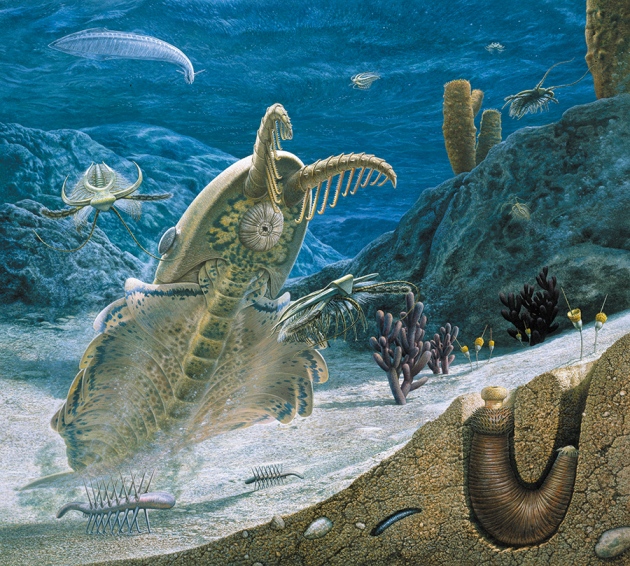When we go back to the Precambrian the differences between plants and animals were probably even less clear," says Fortey. "There isn't any rule that says you have to be demonstrably one or the other."
“要是我们回到寒武纪之前,植物和动物的区别很可能更不明确,”福泰说,“没有任何规定说,你非得明确不是植物就是动物。”
Nor is it agreed that the Ediacaran organisms are in any way ancestral to anything alive today (except possibly some jellyfish). Many authorities see them as a kind of failed experiment, a stab at complexity that didn't take, possibly because the sluggish Ediacaran organisms were devoured or outcompeted by the lither and more sophisticated animals of the Cambrian period.
关于埃迪亚卡拉动物群在哪个方面是不是今天活着的哪种动物(可能除了水母以外)的祖先的问题,意见也很不统一。许多权威把它们看做是一种失败的尝试,想要变成复杂动物而又没有成功,可能是因为懒散的埃迪亚卡拉动物群给吃了个干净,或者在竞争中输给了寒武纪的比较灵活、比较复杂的动物。

There is nothing closely similar alive today, Fortey has written. "They are difficult to interpret as any kind of ancestors of what was to follow."
“今天活着的没有很类似的动物,”福泰写道,“它们很难被解释成是哪种后来出现的动物的祖先。”
The feeling was that ultimately they weren't terribly important to the development of life on Earth. Many authorities believe that there was a mass extermination at the Precambrian-Cambrian boundary and that all the Ediacaran creatures (except the uncertain jellyfish) failed to move on to the next phase. The real business of complex life, in other words, started with the Cambrian explosion. That's how Gould saw it in any case.
我们觉得,它们对地球上生命的发展最终没有起多大作用。许多权威人士认为,在前寒武纪和寒武纪之交的时候,存在大规模的灭绝现象,埃迪亚卡拉动物群(除了水母不大确定以外)都没有能进入下一阶段。换句话说。正经八百的复杂生命始于寒武纪大爆发。反正古尔德是这么看的。
As for the revisions of the Burgess Shale fossils, almost at once people began to question the interpretations and, in particular, Gould's interpretation of the interpretations.
至于布尔吉斯页岩化石的重新分类,人们几乎马上对那些解释提出质疑,尤其是对古尔德对解释进行的解释。













